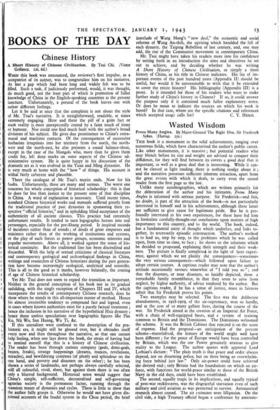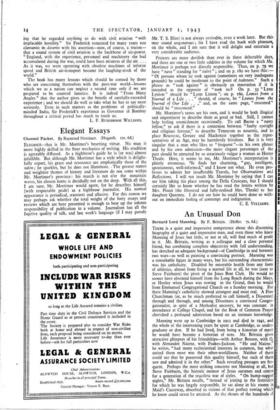Wasted Wisdom
From Many Angles. By Major-General The Right Hon. Sir Frederick Sykes. (Harrap. 258.) THIS book is a monument to the solid achievements, ranging over numerous fields, which have characterised the author's public career. Like other monuments, it is massive ; but potential readers who may blench before its size and weight are advised to conquer their diffidence, for they will find between its covers a good deal that is important, as well as a great deal that is interesting. While it cannot be classed as 'light reading, there is nothing stodgy about it ; and the narrative possesses sufficient inherent attraction, apart from the great events with which it deals, to carry even the casual reader from the first page to the last.
Unlike many autobiographies, which are written primarily for the delectation of the author and his intimates, From Many Angles is informed with serious purpose. Sir Frederick—and this, no doubt, is part of the attraction of the book—is not particularly interested in himself and in his achievements, although these latter are sufficient to give cause for legitimate pride. But he is profoundly interested in his own experiences, for these have led him to formulate carefully-thought-out conclusions upon matters of high importance to this country, and to the world. The book, indeed, has a fundamental unity of thought which underlies, and links together, its necessarily episodic construction. The author's method is to lead us, step by step, to the problems which he was called upon, from time to time, to face ; he shows us the solutions which he decided to propound, explaining their strength and their weakness. The picture is finally completed in the light of later experience, against which we see plainly the consequences—sometimes the very serious consequences—which followed upon failure to adopt certain courses. A captious reader may note that the author's attitude occasionally savours somewhat of "I told you so " ; and that the disasters, or near disasters, so lucidly depicted, show a remarkable family resemblance, in that they seem to arise from neglect, by higher authority, of advice tendered by the author. But the captious reader, if he has a sense of justice, must in fairness admit that Sir Frederick proves his points.
Two examples may be selected. The first was the deliberate abandonment, in 1918-1919, of the air-supremacy, won so hardly, and at the cost of so many gallant lives, during the course of the war. Sir Frederick aimed at the creation of an Imperial Air Force, with a chain of well-equipped bases, and a system of training common to Britain and the Dominions. The Dominions welcomed the scheme. It was the British Cabinet that rejected it on the score of expense. Had the proposal—an anticipation of the present scheme—materialised, the history of the world might well have been different ; for the peace of Europe would have been controlled by Britain, which was the one Power genuinely anxious to give reality to the League. The author quotes with approval Lord Lothian's dictum: "The plain truth is that peace and order always depend, not on disarming police, but on there being an overwhelming force behind just law." Only air-power could have achieved the desired end ; only Britain had the foundations on which an airforce, with functions for world-peace similar to those of the British Navy in the old days, could have been established.
The second, equally tragic in its implications, and equally typical of post-war recklessness, was the disgraceful starvation even of such military and civil aviation as was permitted to survive. Aeronautical research almost ceased. The air estimates were lilliputian. On the civil side, a high Treasury official began a conference by sumounc ing that he regarded anything to do with civil aviation "with implacable hostility." Sir Frederick remained for many years vox clamantis in deserto with his assertion—now, of course, a truism— that a sound system of civil aviation is the backbone of air-power. "England, with the experience, personnel and machinery she had accumulated during the war, could have been mistress of the air. ... As it was, we were operating with obsolete machines of inferior speed and British air-transport became the laughing-stock of the world."
The book has many lessons which should be conned by those who are concerning themselves with the post-war world—lessons which we as a nation can neglect a second time only if we are prepared to be counted lunatics. It is indeed "From Many Angles" that the author gives us the benefit of carefully-recorded experience ; and we should do well to take what he has to say most seriously. Even in such matters as the problems of politicallyminded India, Sir Frederick's experience as Governor of Bombay throughout a critical period has much to teach us.
L. F. RUSHBROOK WILLIAMS.























 Previous page
Previous page